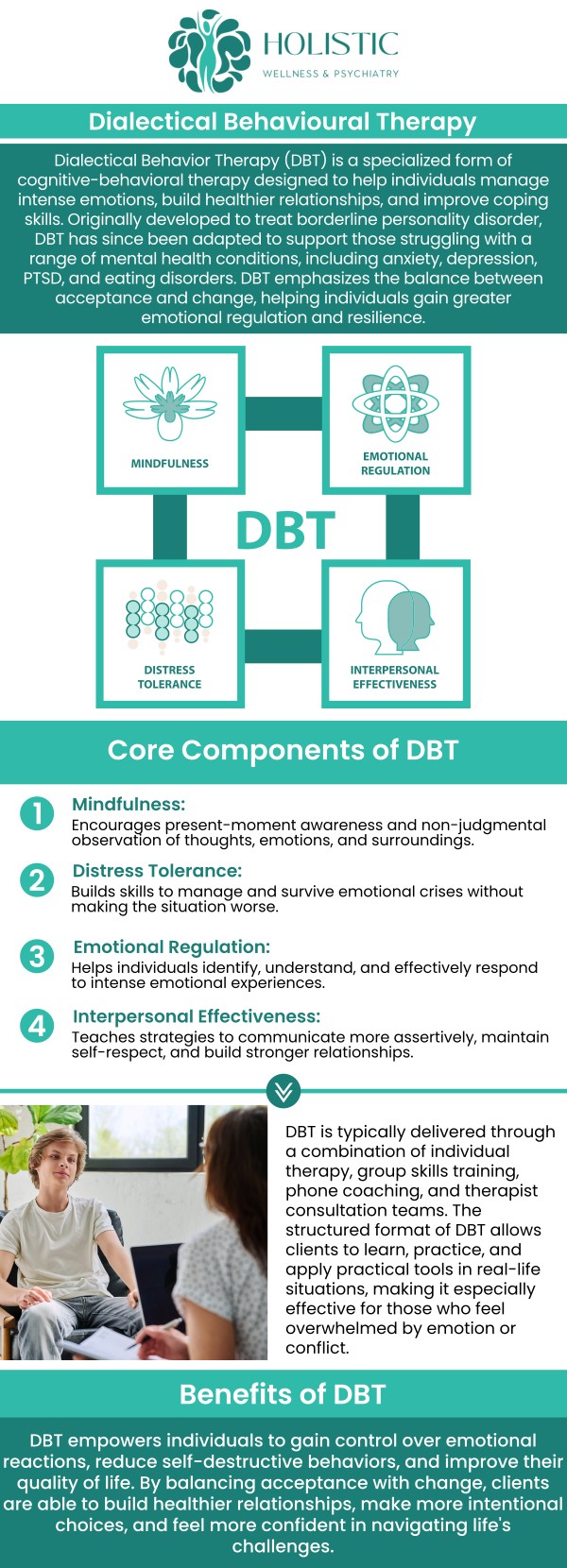Dialectical Behavioral Therapy Specialist in Cedar Rapids, IA and St. Thomas, USVI
Dialectical Behavior Therapy (DBT) is a specialized psychotherapy designed to help individuals manage intense emotions, improve interpersonal relationships, and develop healthier coping strategies. It combines cognitive-behavioral techniques with mindfulness practices to teach skills in emotional regulation, distress tolerance, and acceptance. Visit Dr. Laurie McCormick, MD, DFAPA, at Holistic Wellness and Psychiatry. For more information, contact us or request an appointment online. We have convenient locations in Cedar Rapids, IA and St. Thomas, USVI.


Check Out Our 5 Star Reviews


ADDITIONAL SERVICES YOU MAY NEED
• Functional Medicine
• ADHD
• Yoga & Mindfulness Classes
• Cognitive Behavioral Therapy
• Dialectical Behavioral Therapy
• PTSD
• Grief and Bereavement Therapy
• Psychiatrist
• Holistic Medicine
• Medical Weight Loss
• Depression
• Mental Health
• FDA-Approves Rybelsus (Oral Semaglutide)
• Ozempic
• Compounded Oral Semaglutide (GLP-1)
• Weight Loss Coaching
• Brain Fog
• Family Conflict
• Life Transitions Therapy
• Social Anxiety
• Psychiatry Services
• Integrative Psychiatry
• Medication Management
• Psychotherapy
• Lab & Genetic Testing
• Eating Disorder
• Anti-Inflammatory Nutraceutical Supplements
• Trauma Therapy
• OCD Treatment
• Couples Therapy
• Play Therapy
• Family Therapy
• Integrative Anxiety
• Semaglutide
• Medication Management
• Wegovy
• Compounded Oral Tirzepatide (GLP-1)
• Nutritional Consultant
• Biomarker Testing
• Cognitive Decline
• Hormone Imbalance
• Mood Disorders
• Relationship Issues
• Stress-Related Illnesses
• Ketamine-Assisted Psychotherapy
• EMDR
• Postpartum Depression Treatment
• VA-Authorized Mental Health
• IV Ketamine For Veterans
• LDN – Low-Dose Naltrexone
• Tick-Borne Disease Treatment
• Spravato For Veterans
• Phentermine
• Tirzepatide
• Sermorelin
• Zepbound
• Compounded Sermorelin
• Anxiety
• Emotional Abuse
• Insomnia
• Self-Esteem
• Sexual Abuse

ADDITIONAL SERVICES YOU MAY NEED
• Functional Medicine
• ADHD
• Yoga & Mindfulness Classes
• Cognitive Behavioral Therapy
• Dialectical Behavioral Therapy
• PTSD
• Grief and Bereavement Therapy
• Psychiatrist
• Holistic Medicine
• Medical Weight Loss
• Depression
• Mental Health
• Medication Management
• Ketamine-Assisted Psychotherapy
• EMDR
• Postpartum Depression Treatment
• Psychiatry Services
• Integrative Psychiatry
• Medication Management
• Psychotherapy
• Lab & Genetic Testing
• Eating Disorder
• Anti-Inflammatory Nutraceutical Supplements
• Trauma Therapy
• OCD Treatment
• Couples Therapy
• Play Therapy
• Family Therapy
• Integrative Anxiety
• Semaglutide
• Tirzepatide
• VA-Authorized Mental Health
• IV Ketamine For Veterans
• Spravato For Veterans
• Phentermine
• LDN – Low-Dose Naltrexone
• Tick-Borne Disease Treatment
• FDA-Approves Rybelsus (Oral Semaglutide)
• Sermorelin
• Ozempic
• Compounded Oral Semaglutide (GLP-1)
• Wegovy
• Compounded Oral Tirzepatide (GLP-1)
• Zepbound
• Compounded Sermorelin
• Weight Loss Coaching
• Nutritional Consultant
• Biomarker Testing
• Anxiety
• Brain Fog
• Cognitive Decline
• Emotional Abuse
• Family Conflict
• Hormone Imbalance
• Insomnia
• Life Transitions Therapy
• Mood Disorders
• Relationship Issues
• Self-Esteem
• Sexual Abuse
• Social Anxiety
• Stress-Related Illnesses


